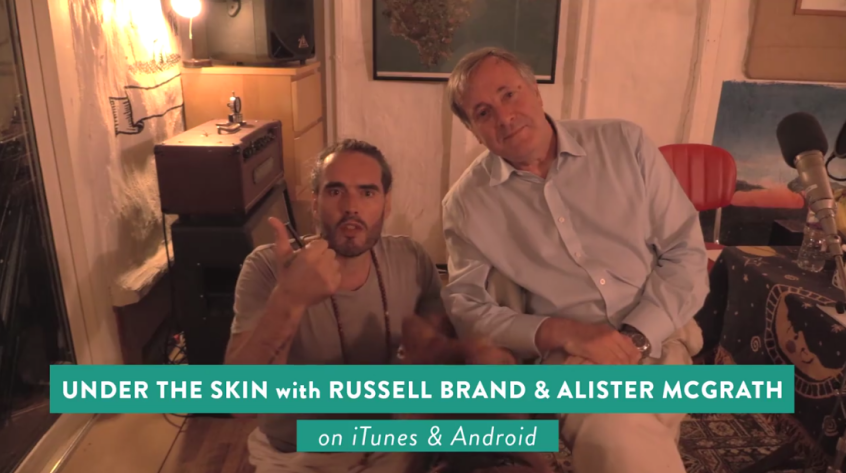It's an unlikely encounter, but popular comedian and provocative activist Russell Brand met this week with acclaimed Oxford professor and Christian apologist Alister McGrath to discuss the question 'Is there any point in God?'

The pair met for a wide-ranging, reflective conversation for Brand's podcast Under the Skin, in which Brand meets guests from academia, pop culture and the arts to explore 'what's beneath the surface – of people we admire, of the ideas that define our time, of the history we are told'.
As an Anglican priest, molecular biologist and Professor of Science and Religion at Oxford University, McGrath straddles the worlds of both science and religion. He and Brand discussed the pressure points, even though as McGrath sees it, both science and religion should work together to give a 'big picture' of the universe.
The tension between science and religion, he said, has often been 'all about power, who do you trust? Who's the top guy?' McGrath spoke from his own background as a committed atheist growing up in violent, religiously divided Northern Ireland in the 1960s. He had thought: 'If there was no religion, there'd be no religious violence...religion was a malevolent religious force.'
McGrath was once committed to a strict materialism that judged truth only on what could be empirically proved. But, he found, 'the really big things like "What's life all about?", "What is the good?", these lie beyond proof. We've got to go beyond what we can prove to lead meaningful lives.'
Rather than it being a combative debate, the conversation saw Brand frequently resonating with McGrath's ideas. He said he liked the idea of Christ's call to 'die to self' and being 'decentred by something bigger', and the ideas of deeper layers of truth and meaning to reality that McGrath spoke about.
However, Brand also said he was 'sympathetic' with the atheist worldview, given all the wrongs that have been committed in the name of religion. And he noted that in contemporary culture 'science' seems to hold far more value than religion.
While religion seems to be often bound up in power struggles, and demands faith where there is no proof, 'science has solved the problems where mankind most needed them to be solved, dealing with death, disease, fear...Connection, communication, healing...all of these problems seem to have been resolved [by science]', Brand said.
But, he added, a void remains. He said: 'My fear of atheism is that if there is nothing else, the material, the mechanical...then why not materialism? Why not individualism...without a deeper truth, for me there is only hedonism. Only indulgence.'
McGrath agreed, saying: 'What we need is a way of thinking that says no, you're part of something bigger, you need to go figure out what that is and transcend yourself, stop making the universe about you.'
Reflecting on his previous podcast interviews, Brand reflected that many of his guests had shared a common idea, a sense that human beings, particularly in the west, 'need a vision' – wearied by the dead-end, cynical, hedonistic worldview of consumer-capitalism.
Again, McGrath agreed, saying that materialism 'boxes us in'.
He said: 'This is an age of fading dreams dying visions...I think we need hope. [But] that's not about being optimistic. No, it's saying things might actually get a lot worse. But there is meaning and once we see that and embrace it we can cope with whatever gets thrown at us and we feel we can do something with it, and there's a bigger vision of which we're a part and it empowers us to keep going even when it seems the world is falling to bits around us.'
The full conversation can be listened to here.













